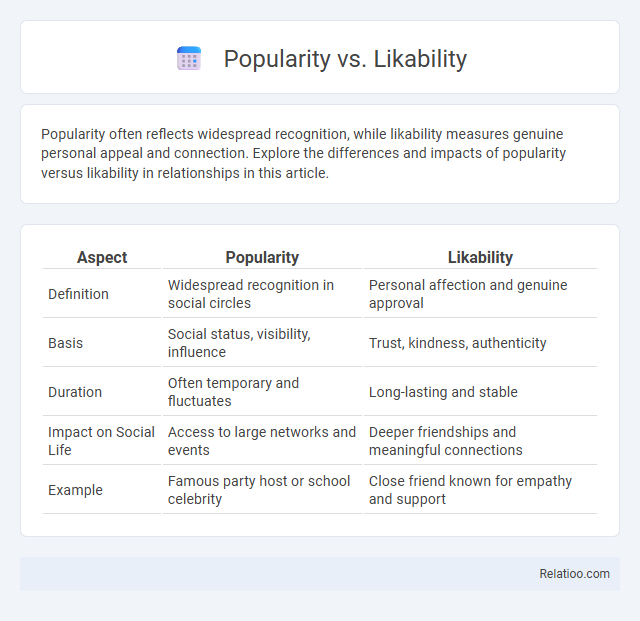Popularity often reflects widespread recognition, while likability measures genuine personal appeal and connection. Explore the differences and impacts of popularity versus likability in relationships in this article.
Table of Comparison
| Aspect | Popularity | Likability |
|---|---|---|
| Definition | Widespread recognition in social circles | Personal affection and genuine approval |
| Basis | Social status, visibility, influence | Trust, kindness, authenticity |
| Duration | Often temporary and fluctuates | Long-lasting and stable |
| Impact on Social Life | Access to large networks and events | Deeper friendships and meaningful connections |
| Example | Famous party host or school celebrity | Close friend known for empathy and support |
Understanding Popularity and Likability
Understanding popularity involves recognizing it as a measure of how well-known or visible someone is within a group, often driven by social influence or status. Likability, however, reflects the degree to which others genuinely enjoy or appreciate a person's character and behavior, leading to authentic relationships. Distinguishing between popularity and likability helps clarify that being well-known does not always equate to being well-liked, highlighting the importance of trust and empathy in social dynamics.
Key Differences Between Popularity and Likability
Popularity often hinges on social influence and widespread recognition, while likability is rooted in genuine personal qualities such as kindness and approachability. Popular individuals may enjoy broad attention but not necessarily deep personal connections, whereas likable people tend to foster trust and positive relationships regardless of their social status. Understanding these distinctions highlights that popularity is externally driven, whereas likability is internally perceived and emotionally resonant.
Psychological Foundations of Popularity
Popularity is often driven by visibility and social status, whereas likability stems from personal warmth and trustworthiness, rooted in different psychological foundations. Psychological studies highlight that popularity relates to perceived influence and social dominance, while likability arises from empathy, cooperation, and positive social interactions. Understanding these distinctions helps clarify how social behaviors and emotional intelligence contribute uniquely to one's social standing and interpersonal relationships.
What Makes Someone Likable?
What makes someone likable lies in genuine empathy, active listening, and authentic kindness that resonate on a personal level. Your ability to connect through understanding others' emotions and showing sincere interest creates lasting positive impressions. Unlike popularity, which often hinges on widespread visibility, likability is deeply rooted in meaningful interpersonal connections.
The Role of Authenticity in Likability
Authenticity plays a crucial role in likability by fostering genuine connections and trust, making individuals more relatable and approachable. While popularity often hinges on visibility and influence, true likability stems from consistently expressing your authentic self, which nurtures meaningful relationships. Balancing popularity and likability through authenticity enhances your social impact and long-term personal and professional success.
Social Dynamics: Popularity in Groups
Popularity in groups often stems from social influence and perceived status, while likability relates to personal warmth and trustworthiness. You can be popular without being liked if your influence is based on power rather than genuine connections. Understanding the balance between popularity and likability helps navigate social dynamics and build meaningful relationships.
Can You Be Popular Without Being Likable?
Popularity often stems from visibility and influence within a group, while likability is rooted in personal warmth and positive interactions. It is possible to be popular without being likable, as individuals can gain social status through fear, intimidation, or mere prominence rather than genuine affection. Studies in social psychology reveal that likability enhances long-term social bonds, but popularity alone can sustain short-term social dominance.
Why Likability Often Outlasts Popularity
Likability often outlasts popularity because it is rooted in genuine personal connections and trust, which foster long-term relationships. Popularity is typically driven by external factors like trends or social status, making it more fleeting and susceptible to change. Sustained likability depends on consistent empathy, authenticity, and positive interactions that resonate deeply over time.
Cultivating Likability Over Popularity
Cultivating likability over popularity enhances your genuine connections and fosters long-term trust, making relationships more meaningful and sustainable. Likability stems from authentic empathy, active listening, and consistent kindness, which create positive impressions that popularity alone cannot achieve. Prioritizing likability shifts your focus toward deepening engagement rather than merely seeking widespread approval.
Choosing Between Being Liked and Being Popular
Choosing between being liked and being popular involves understanding the long-term value of genuine relationships versus widespread recognition. Likability fosters deep connections and trust, which can lead to lasting personal and professional success, while popularity often provides transient attention without meaningful support. Your decision should prioritize authentic interactions that enhance your reputation and emotional well-being over superficial approval.

Infographic: Popularity vs Likability
 relatioo.com
relatioo.com